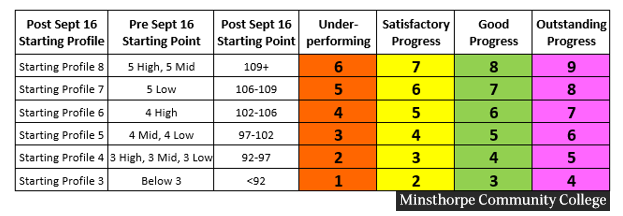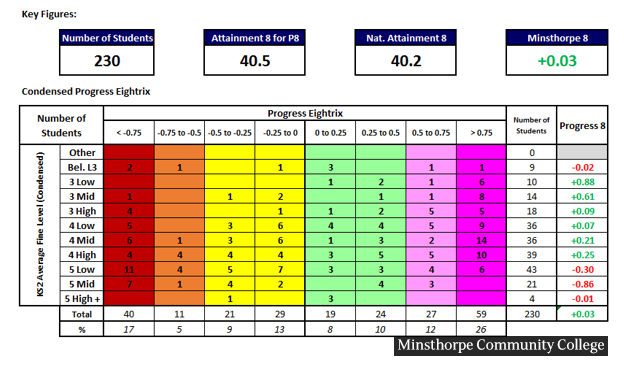
 Vice Principal Mark Gilmore describes how Minsthorpe Community College ‘planned for the unknown’ between KS2 and KS4…
Vice Principal Mark Gilmore describes how Minsthorpe Community College ‘planned for the unknown’ between KS2 and KS4…
Assessment is a continuous process, integral to teaching and learning. At Minsthorpe, it is developed and implemented in such a way as to maximise understanding of what students know, understand, and can do. We also use it to identify any areas for further improvement or development and to celebrate achievements in their broadest sense. It necessitates a whole-college approach and must involve all teachers, all students and, wherever possible, all parents.
Following the government’s decision to abolish national curriculum levels, schools across the country were required to develop new ways to assess progress and attainment so that students and their parents know how well they are doing and how to improve.
Indeed, the ability to escape from the whole culture of levels is the key to raising standards – by enriching learning and student motivation; and enabling teachers to grow professionally and make better use of their time, knowledge and skills. Before, teaching was too focused on getting students across the next level, instead of first ensuring they were secure in the knowledge and understanding. Pace was a driving force, taking priority over depth and breadth of understanding. Students were placed in a level, but left with serious gaps in their knowledge and understanding. This meant it wasn’t always clear exactly which areas of the curriculum the child was secure in, nor where the gaps were.
The ability to escape from the whole culture of levels is the key to raising standards
‘Mastery’ curriculum
As we began to redesign the KS3 curriculum using the principles of a ‘mastery’ curriculum, subject teachers discussed and agreed what standards were expected from each threshold in terms of core knowledge and skills that constitute mastery. Based on the principle of reverse engineering, we established the knowledge and skills that were important for success in KS4. We then ensured that the KS3 curriculum provided a bedrock for students to achieve these core competencies, and to exceed them. This enabled staff and students to focus on what was needed to progress within each threshold and then go on to achieve success at GCSE.
The curriculum and its assessment had to do three key things for our students: understand where they currently were; show where they needed to get to; and explain what they had to do in order to get there. Self-belief is important – but more important is providing students with the tools to make the improvements that allow them to achieve.
The assessment process
Each student arrives in KS3 with a ‘starting profile’ based on their KS2 outcomes. Six starting profiles effectively cover our cohorts. Allocation to a starting profile is based on the average of KS2 English and maths: where no data is available we use baseline tests. The starting profiles/targets have been devised using Progress 8 methodology, in order for students to achieve a positive Progress 8 score across eight subjects.
Using the GCSE 9-1 grades, students are able to track the progress they are making towards GCSEs. Teachers track individuals in their teaching groups as well as overall progress, and make interventions where necessary. Team leaders and the leadership team can track overall progress of teaching groups, teams and the college.
Although we are using discrete numbers 9-1, each number on the scale is indicative of a wide attainment range. Teachers use their judgement, based on assessments of different kinds, to estimate the ‘best fit’ grade. As we get to know how the new GCSE grades work in practice, we will be able to make these estimates more accurately.
Teachers use their judgement, based on assessments of different kinds, to estimate the ‘best fit’ grade
Crucially, the numbers do not form a ladder. Students making progress at the same rate will retain the same grades throughout the years. There is no limit on anyone’s progress or attainment; students who continually improve their rate of progress will see their grades rise.
This system enables us to encourage a growth mindset. It reports on how students have done relative to their starting point, rather than whether they have achieved a target level (which can place limitations on achievement). It speaks to our core philosophy that meeting targets should be a given, exceeding them the aim.

Students’ progress is now tracked across five years. Three assessment points per year lead to data reports including grades for progress (as well as attendance, behaviour, attitude to learning and home learning). In all years, this information is collated into a motivation grade and celebrated through various positive rewards as well as giving us key information to intervene with students falling behind.
The progress information collected is used to produce our assessment point analysis tool (APA Pro) to give us a detailed analysis, from whole-college level down to student level.

Reporting on how students have done relative to their starting point encourages a growth mindset
We’re always delighted to feature the successful initiatives and strategies of schools within the SSAT network and are always on the look out for more participants. Please do get in touch if you’d like to get involved.

Shailen on said:
Hello, is it possible to send me a print copy of this page please?